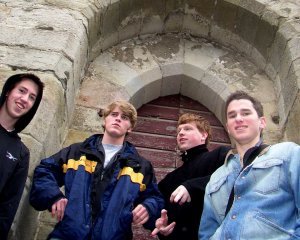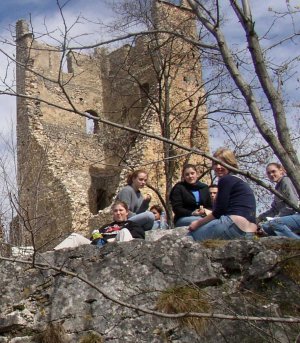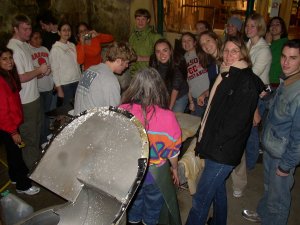| Quinze Jours
en France
Lasso Online asked editor Stephen
Twentyman to share his observations about his recent visit to Toulouse,
France, during the annual student exchange between George Mason and its
sister school Lycee Ozenne in Toulouse.
By Stephen Twentyman (April 23,
2004)
I left for France on the afternoon
of Saturday, the 27th of March. The flight was a typical international
flight in that it was very long and rather boring, and, it being over the
course of an afternoon, Eastern time, I didnít sleep a wink and was therefore
terribly jet-lagged by the time we got to Paris, as day was breaking on
the 28th.
I am happy to say that Charles de
Gaulle Airport is nowhere near as horrific as many travellers claim it
to be. There were cigarette butts all over the place, but I didnít see
any incidents of public urination and, to my delight, it wasnít the dimly-lit
labyrinth that I had expected. I couldnít mentally function very well at
all at this point, and so just followed everybody else to the next terminal,
but all-in-all, Iíd say that Dulles is a far more obnoxious airport.
 |
I picked up a few newspapers,
but it was impossible to keep focused; for the next few hours. I mostly
just amused myself by trying to stay awake and watching the camouflaged
(I canít say their disguise worked very well, though) security guards point
their rifles at each othersí heads and laugh about it. I didnít get searched
at all in my way to France (although I did find an ominous note from the
Department of Homeland Security notifying me that some goon had rifled
through my luggage, and sorry if they broke any locks, but they couldnít
be held responsible); the way back was a little less fortunate. Iíd be
lying if I said I didnít enjoy it on some level; being delayed 10 minutes
while a guard makes you empty your pockets and take off your shoes and
jacket while searching every nook and cranny of your carry-on does rouse
a bit of righteous anger, and we all like to be a bit ticked off in the
name of personal freedom every now and again. These searches were conducted
at random, which makes one wonder how effective it is if itís entirely
possible for every passenger carrying a weapon to be skipped over in favor
of innocent tourists. |
Members of the Class of 2004 pose
in front of the
ruins of an ancient building. |
| I slept the whole flight
to Toulouse and, after a brief interval, slept all afternoon at my host
familyís house before sleeping all night and waking up in the morning bright
and fresh and ready to go.
Toulouse is a really nice place.
If Paris is the New York of France, Toulouse is its Ottawa: smaller, sleepier,
and less eventful, but very friendly and clean and easy. Itís a
laid-back place, which made the trip to Paris that much more unpleasant.
The Lycée Ozenne (our host school; lycée roughly corresponds
to our high school) was in a bit of a run-down part of town, but it was
hardly a rough part of town; there was much graffiti, many poor
immigrants, and a certain amount of trash and cigarette butts on the ill-kept
sidewalks. In spite of this, the area felt very safe and even friendly.
There were no pickpockets and nearly everybody was quite friendly and courteous.
A tourist is a bit of a novelty in the city, and I was generally treated
very well and with an amount of interest. The French (or the Toulousains,
rather) were not hostile, and if they hated America, they sure kept quiet
about it. Nobody was in love with the U.S., either; most disagreed quite
fiercely with our government but realized that many in our country do,
as well. Being quiet, polite, and speaking passable French also helped.
Just as we imagine a typical Frenchman to be a wiry snooty hothead with
a striped shirt, beret, and Gauloise in mouth, the French imagine an American
to be a boorish cowboy who barks orders in English between mouthfuls of
chaw and McDonaldís. |
| Going over there, I
expected the war to be a much bigger deal than it turned out to be. While
I never got in any sort of serious political argument (I had a 20-minute
conversation once while waiting for a bus, but that was it. Itís easier
than one would think; many times, you can just say a Latin-derived word
with a French accent and itíll be reasonably close), I read the papers
daily. General consensus is that the war is a catastrophe, but thatís about
it. Americans feel much more strongly about the matter, both for and against.
It does make sense: after all, it is our war. News from Iraq got press,
of course, and Le Monde ran a few editorials during the worst of
it (the days following Fallujah when all hell broke loose) criticizing
the coalitionís ineptitude; however, there was never any sort of "we told
you so" or taunting. I similarly (as I said above) didnít get any sort
of lip for my country of origin (although I heard that a few other group
members did). The polls are known in France, as well, and an American is
just as likely to oppose the war as support it. In addition, we had made
something of a political statement simply by showing up in the country
and taking an interest in the language and culture. The jingoistic types
who hate the French would have simply stayed home; an American traveller
in France is therefore more likely to at least be open-minded about the
situation. Iíd imagine that it would be quite different in Spain or Poland,
however. |
 |
Juniors Sarah Stanley, Stephanie
Peters, Helen-Rose
Patterson, Caroline Leamon, and Senior Erin Bugg
admiring the beauty of the ruins of an ancient castle. |
| The newspapers had their
own thing to cover. The day before we came, France held regional elections
(I donít fully understand it, but itís a bit like state delegate elections
here) in which Jacques Chiracís government took a pounding. As in most
parliamentary democracies, there are many, many political parties. The
first round of elections pares this mass of parties into a group of the
most popular ones; they then band together into coalitions to run for office.
In this particular election, there were three: the left, the right (Chiracís
supporters), and the far right (essentially Fascists). In 21 of Franceís
22 regions, the left won. This is an almost unimaginable landslide in America;
it can really be compared only to the 1972 or 1984 presidential elections
(only for a lesser office, of course). The lone holdout was Alsace, prompting
a week-long series of political cartoons in Le Monde depicting Chirac
in German peasant dress. Although it was for a relatively minor office,
it was a clear vote of no confidence by the people, and so Chirac and PM
Jean-Pierre Raffarin spent the bulk of our trip re-arranging the cabinet
and policies in a panicky attempt at damage control.
The election was the major news story,
overshadowing Iraq on many days (at least until Moqtada al-Sadrís rise
to power). Strangely enough, there was little more than a peep about it
at home. I can certainly understand, but still found it surprising that
a news event which was so enormous in one country can be almost completely
ignored in another. During the second week, France and the U.K. had a grand
old time celebrating the centennial of the Entente Cordiale, an Anglo-French
alliance that would develop into the Triple Entente (of World War I fame).
More importantly, the alliance established a friendly Anglo-French rapport
after centuries of hating each othersí guts; they decided that Germany
was a greater threat than each other and so set the stage for Western Europe
as we know it. On a related note, the Queen took a lengthy royal tour of
the country that included a stop in Toulouse, where she was received in
the very same room of the Capitole (a fantastic 18th-century
palace that houses the Toulousain city hall) as we were a week earlier
by the mayor. To be honest, even though he/she spoke to us and greeted
us, I had no idea who the mayor was. There were about five important-looking
people who offered a few words to the group. Any one of them could have
been the mayor.
 |
The Capitole is about
four blocks from the Lycée Ozenne. French school is very interesting,
quite different from ours, and not entirely very good. The students are
very defensive of their school system and love it. Personally, I felt that
the six classes I attended were quite enough for a lifetime. Class runs
from 8:00 A.M. to 6:00 P.M., Monday through Friday (either they had the
Saturday off or the Lycée Ozenne doesnít do the half-day-on-Saturday
thing). Thatís a terribly long time to spend at school, and the classes
really donít make up for it.
Outside of class, the school is easily
better than George Mason. Instead of a single building, it consists of
several surrounding an enclosed courtyard. It is very much like one of
those enclosed bourgeois town houses, if you know what Iím talking about,
right down to the gate that students pass through to get into the courtyard.
A student must go to many school buildings in the course of a day, so the
courtyard takes the place of our hallways in that it is a meeting place
and a between-class hang-out. Itís cobblestoned and landscaped in the middle,
with plenty of trees and plants to make the passage prettier. |
The excited French students smile
happily at the
camera at a paper making factory. |
The courtyard is in stark contrast
to the school buildings, which are much more austere and utilitarian. The
halls, intended for a continuous flow of movement (at least there arenít
any hall-blockers) are very narrow and dimly-lit. The walls are completely
blank; the hallís only purpose is to be a passage between a classroom and
the outside. The classrooms are slightly more cheery, but are nowhere near
the plainest room at George Mason. There are no posters on the walls of
the small and cramped rooms; upon entry, the 35 or so students take their
seats. Students do not have individual desks as they do here; at the very
least, there are two chairs to a table (as in elementary school). |
When the bell sounds, the teacher
walks in; the next hour is spent in uninterrupted lecture. All of the classes
that I attended followed this same format: the teacher speaks, and the
students rush to scribble down everything he says. The only interaction
that takes place is if a student needs clarification or in response to
an assigned exercise. After an hour of note-taking, the bell rings again,
and the 35 students shuffle out to the courtyard for a five-minute break.
The student does not have an individual schedule; the same group of 35
stays together as it goes from class to class. On the bright side, the
French have more open periods than we, and their lunch is supposedly first-rate.
I never got to eat it. According to those with enough patience to wait
40 minutes in line, it was quite good. I waited about 20 minutes before
deciding it just wasnít worth it and that the line was moving about an
inch a minute. I nipped out to a café instead for a quick bite.
That was a beauty of the French education
system; just about everybody has open campus, and there is more to do in
the immediate area than there is in a mile of George Mason. Big supermarkets
are unknown over there. It amazed me to see how much that affected everyday
life; there are many people who routinely blast big supermarket chains,
claming that it forces mom Ďní pop stores out of business, but itís surprising
that they rarely touch on the point that having a bunch of small stores
fills space in a city and provides things to do and places to go. Instead
of a Giant or Safeway, the French city has shops in every conceivable field
of expertise. There are so-called supermarchés, but these are hardly
the same thing as our concept. They sell produce and dry goods and are
therefore no bigger than any other shop. A boulangerie (bakerís shop) and
patisserie (pastry shop) sell just that; theyíre often in the same store.
Thankfully, the obnoxious low-carb craze hasnít hit France, and likely
never will; they value their croissants and beignets too much, as they
should. There are two places to buy meat: a boucherie (butcherís shop)
is where one buys raw cuts, and a charcuterie sells grilled goods (often
kebabs, owing to the large number of Middle Eastern and North African immigrants).
Tobacconists also sell film and postcards, newsstands sell newspapers and
sometimes books, and a papiterie (stationerís shop) sells paper and writing
implements. In America, most of these shops are condensed into a supermarket
or office supply store. While it may seem somewhat of a hassle, I prefer
these small shops; quaintness and novelty are obvious aspects, but there
are other reasons. Bread and pastries are legitimately better when the
shop focuses exclusively on them and nothing else, and the staff are generally
more knowledgeable, as opposed to the jack-of-all-trades who work at large
supermarkets. Also, as I noted above, having more shops livens up a city
block. Instead of an endless line of laundromats, convenience stores, pawn
shops, and liquor stores, the French city fills its places with a lively
variety. The city enjoys better health as a result; people are more likely
to walk about when there is something to walk to.
Unfortunately, we eventually left
Toulouse for a three-day stay in Paris before heading back home. Paris
is everything Toulouse is not: itís crowded, impersonal, rude, dangerous-feeling,
smelly, and full of tourists, Parisians who hate tourists, and Parisians
who love touristsí wallets. We travelled as a large group around the city,
which led to our being sometimes embarrassingly loud (in English, no less).
There were plenty of exasperated looks from the locals, but when we broke
into smaller groups, it was much more manageable. Conversations took the
typical Parisian form (i.e., I would ask a question in broken French, get
an answer in perfect English, and I would reply again in French), but I
like to think that they were just trying to be helpful by putting it in
our tongue. If they were truly trying to act superior, they would likely
just give a "Zut alors! Je comprends pas" and walk off with a huff.
The Parisians werenít quite as rude as their reputation, but we did get
plenty of dirty looks in the larger group. Then again, how would you respond
to a group of 20 foreigners blocking the way, some of whom are talking
very loudly in another language?
The biggest problem in Paris was
that itís apparently some sort of grave humiliation to pick up after oneís
dog. Main boulevards are generally clean, but smaller side streets are
littered with unsightly piles that far too often get themselves stuck in
the grooves of your shoe. It is not an exaggeration to say that on an average
block of a Parisian back street, one must dodge four of them. Itís hard
to see the scenery when your eyes are glued on the pavement directly in
front of you.
After three days of the usual sight-seeing
in Paris, we spent a sleepless night in which the concierge, fed up with
some of our groupís noise, came up to scream at us to shut up and go to
bed. Several hours later, at 6 A.M., we rose, went back to Charles de Gaulle,
and passed an uneventful flight back to Dulles. It was a very good trip
all-in-all; the Parisian leg was a bit of a downer, but it was probably
a good thing that it was stuck at the very end and that we were a bit thankful
to be getting home. I canít imagine how it would have been if we had flown
home directly from Toulouse, that great city in the South of France.
Tell us what you think.
E-mail lassogmhs@hotmail.com
|

